sol2070 rated Station Eleven: 5 stars
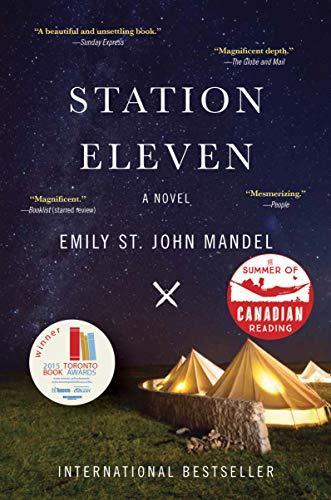
Station Eleven by Emily St. John Mandel
The international publishing sensation now available in paperback: an audacious, darkly glittering novel about art, fame and ambition, set in …
Costumo ler fic-spec, filosofia, sobre natureza, política, tech etc. Mais livros no blog → sol2070.in/livros Também escrevo ficção científica → fic.sol2070.in/ Mastodon → @[email protected] Clube do livro Contracapa → contracapa.club
This link opens in a pop-up window

The international publishing sensation now available in paperback: an audacious, darkly glittering novel about art, fame and ambition, set in …
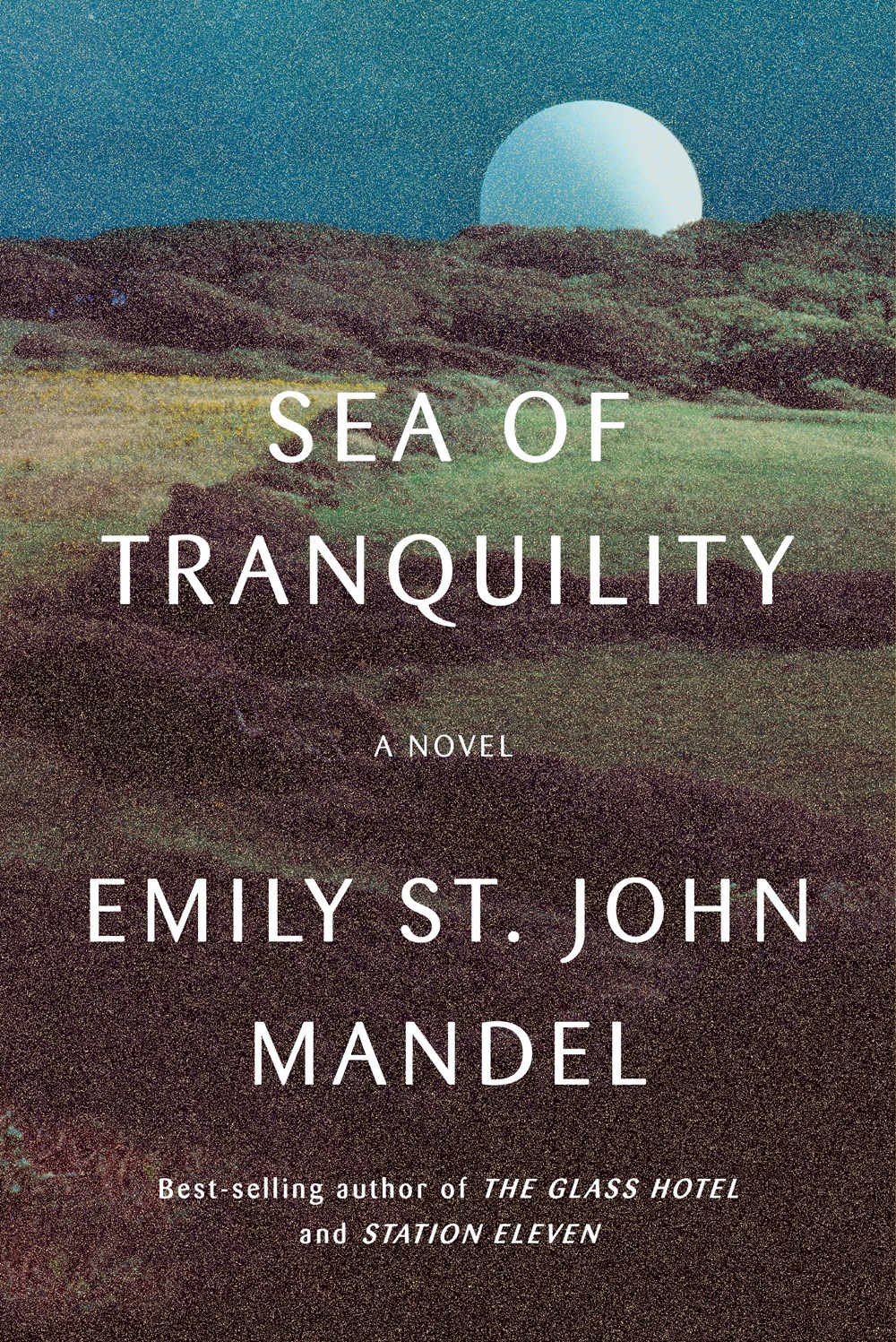
Edwin St. Andrew is eighteen years old when he crosses the Atlantic by steamship, exiled from polite society following an …
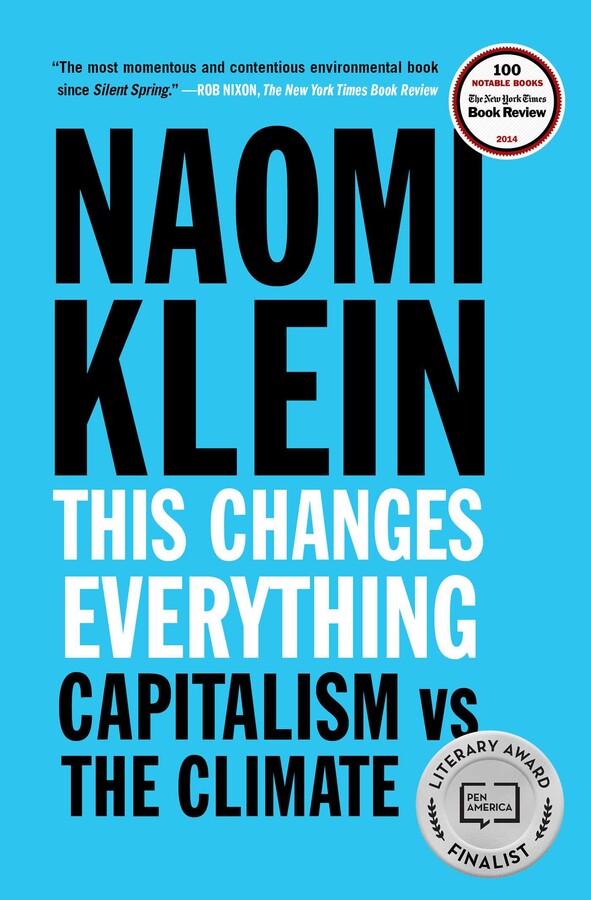
In This Changes Everything Naomi Klein argues that climate change isn’t just another issue to be neatly filed between taxes …
(em português → sol2070.in/2023/09/O-segredo-das-%C3%A1rvores)
I think "The Overstory" (2018), by Richard Powers, was the best fiction I've ever read. "I think" because I didn't stop to create a ranking, but I can't remember anything so powerful.
I finished a second reading with a more intense impression than the first. In recent years, this was one of the only books I wanted to re-read immediately after finishing -- the other was Jeff Vandermeer's "Southern Reach" trilogy.
They say that the perfect book is the one you finish with the feeling of not being the same person anymore. A critic said that about "The Overstory" and, yes, absolutely. The work -- which won the Pullitzer Prize for best fiction in 2019 -- manages to open up perception and empathy with other beings in this profound dimension of the interconnectedness of life.
It's a story that gradually interconnects the lives of nine people …
(em português → sol2070.in/2023/09/O-segredo-das-%C3%A1rvores)
I think "The Overstory" (2018), by Richard Powers, was the best fiction I've ever read. "I think" because I didn't stop to create a ranking, but I can't remember anything so powerful.
I finished a second reading with a more intense impression than the first. In recent years, this was one of the only books I wanted to re-read immediately after finishing -- the other was Jeff Vandermeer's "Southern Reach" trilogy.
They say that the perfect book is the one you finish with the feeling of not being the same person anymore. A critic said that about "The Overstory" and, yes, absolutely. The work -- which won the Pullitzer Prize for best fiction in 2019 -- manages to open up perception and empathy with other beings in this profound dimension of the interconnectedness of life.
It's a story that gradually interconnects the lives of nine people with trees. The main difference is that it positions these plants as a kind of central character, in an active and almost demiurgic way.
As the author says, we imagine that reality is what we perceive in front of us. The problem with this view is that it is limited to the time of human perception. Trees, on the other hand, move, "talk" and even store memories on a much slower scale, to the point of being almost invisible. Only in the last few decades have things like tree communication, cooperation and intelligence begun to be seriously studied.
An old scifi pulp story, mentioned in passing in the book, illustrates this human blindness. Earth is invaded by an advanced alien species that is not only tiny, but very fast. One human second is equivalent to one year of these aliens. They perceive people as gigantic statues. They try to study them and even communicate, but get no response. Concluding that there is no sentience there, they destroy everything to feed themselves.
There is another passage that demonstrates this central theme: life that is able to recognize itself in other forms of life. In the book, a lawyer mentions that the history of humanity could be summed up in the gradual expansion of rights to people who previously had none. In ancient times, children were not considered people. Then they were. Then women, black people, native peoples, non-binary, etc. In countries with advanced culture, such as New Zealand, sentience is now being legally extended to various animals.
This book manages to convey the experience that nature, and especially plants, go far beyond being mere resources. We are all sentient beings. "Overstory" is a botanical term that refers to the upper cover of a forest but, considering the words involved, it could also means "all-encompassing story".
Fortunately, the book fully transcends ecological pamphleteering. Powers is one of America's most renowned authors. "The Overstory" is so well written that it makes the bestseller books sound like kids' writing. As I read, I remembered that the last time I came across such literary beauty was "Underworld", by Don DeLillo, or "Gravity's Rainbow", by Thomas Pynchon -- two celebrated novelists to whom Powers is often compared. For me, this was an aesthetic explosion because I don't usually read high literature, preferring to be entertained by "cheaper" things.
In addition to the enchanting writing, this book also shines in meaning, painting ecology in cosmo-existential tones. It basically delivers the great transcendent-immanent experience that I always mention - when I comment about Spinoza, psychedelics, philosophy of consciousness etc. It often provokes tears, not for sad or beautiful unfoldings, but for emotions as vast as life.
When I read it for the first time, about three years ago, I liked it so much that I couldn't put it down and finished it in a few sittings. Now, in the second edition, many other aspects have opened up, such as the magic of the sentences, the depth of the characters, symbolism, new connections between apparently separate stories...
At one peak moment, literally, of the story, an activist camped out in civil disobedience on top of a giant sequoia with his new life partner, who is a kind of modern prophetess, amidst the rubble of the socio-environmental saga in which his existence has been turned upside down, admits with nostalgia something like: "I think the curve of my life has just reached its peak. Everything that comes after will never compare...". "The Overstory" manages to transfuse emotions like this directly into the heart.
It's a shame about the current decline of the Brazilian publishing market, which is lacking so many exceptional books like this one. The good news is that the producers of the acclaimed series "Game of Thrones", who say they love this book, are going to adapt it into a Netflix miniseries.
This will come after another fabulous adaptation they are finalizing, that of the scifi trilogy "The Three Body Problem". I think this is the best "first contact" story I've ever read, but that's for another post.
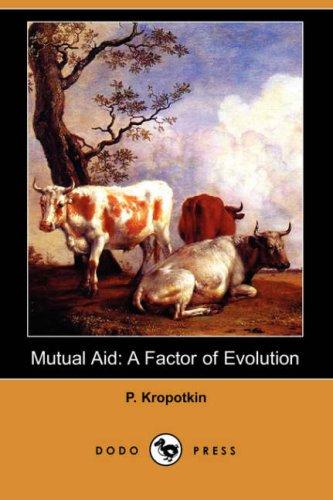
Mutual Aid: A Factor of Evolution is a 1902 collection of anthropological essays by Russian naturalist and anarchist philosopher Peter …
(em português → sol2070.in/2023/09/Fic%C3%A7%C3%A3o-cient%C3%ADfica-como-sempre-quis )
"The Actual Star" (2022), by Monica Byrne, is the kind of book I'm always looking for in science fiction, but rarely find. It combines several of the topics that interest me most today: post-apocalyptic utopia, anarchism, psychedelics, climate emergency, regenerative technologies, cosmo-spiritual questions, etc.
The summary doesn't look like much: three interconnected stories set a thousand years apart - in 1012, 2012 and 3012 - that use Maya mythology to talk about reincarnation, collapse and regeneration. In fact, as soon as I read the synopsis, I wished distance, imagining something new age, with "age of Aquarius", Maya calendar, or "conspirituality". At the very least, it sounded like a hackneyed story, like that average movie "Cloud Atlas" (2012), by the Wachowski, or the great "The Fountain" (2006), by Darren Aronofsky.
But I saw a lot of effusive praise, even from people I admire like Kim Stanley …
(em português → sol2070.in/2023/09/Fic%C3%A7%C3%A3o-cient%C3%ADfica-como-sempre-quis )
"The Actual Star" (2022), by Monica Byrne, is the kind of book I'm always looking for in science fiction, but rarely find. It combines several of the topics that interest me most today: post-apocalyptic utopia, anarchism, psychedelics, climate emergency, regenerative technologies, cosmo-spiritual questions, etc.
The summary doesn't look like much: three interconnected stories set a thousand years apart - in 1012, 2012 and 3012 - that use Maya mythology to talk about reincarnation, collapse and regeneration. In fact, as soon as I read the synopsis, I wished distance, imagining something new age, with "age of Aquarius", Maya calendar, or "conspirituality". At the very least, it sounded like a hackneyed story, like that average movie "Cloud Atlas" (2012), by the Wachowski, or the great "The Fountain" (2006), by Darren Aronofsky.
But I saw a lot of effusive praise, even from people I admire like Kim Stanley Robinson and Cory Doctorow. I discovered that there's even an anarchist utopia and decided to give it a go. When I finished it, I got that feeling from the first paragraph; this is my kind of book.
The scifi setting is an extremely reduced, resilient and advanced civilization that has managed to overcome capitalism. While there are no governments, exploitation or hierarchies of power, a salvationist religion predominates, with its origins in 2012, dating back to the Maya.
The pace is uneven. There are page-turning sequences, and many that aren't so intense, describing scenarios, conversations, etc. But it's the kind of book that only reveals its full value at the end.
My worst expectations were shattered several times. I imagined that perhaps the story would glorify Maya culture, as is usually the case with new age tales. But no. There is an intense immersion, quite educational even, in an aspect considered repulsive, that of rituals with human sacrifice. It kind of blew my mind: there's a whole dimension to this that I was completely unaware of.
As the author has a background in science and the study of religions, I also feared that the story might be heading towards the commonplace of deconstructing religious myths. But wow... it's so much more than that!
The book is very current because it includes a planetary context of the "cli-fi" type (climate fiction). Nowadays, when I see an apocalyptic story that ignores this, inventing some other reason for the disastrous situation, I disregard it.
The futuristic part is not easy to follow. It involves perhaps hundreds of new words (the glossary at the end is essential). But the innovations in language are quite interesting. They accompany a gender evolution where everyone is intersex, at least physiologically, and reflect cultures from the global South that have come to dominate (decolonization is a central theme in the story), as well as fantastic technologies - for example, augmented reality in conjunction with endogenous doses of psilocybin, or extrasensory lobes.
There is also a lot of dialogue in Kriol, a dialect of Belize, in Central America, with similarities to English, which for English speakers is already very difficult to understand. For me, almost all of these sentences went unheard. But I was able to follow the story.
People were also offended by the intensely explicit descriptions of sex and mutilation. It really isn't for everyone's taste, but nothing that distracts too much from the plot.
Entropy A central element that I loved, and which has kept me thinking until now, was the discussion of entropy, the fact that every organized system faces a constant movement of degeneration. This is extrapolated to cosmological (e.g. the expansion of the universe into an icy void), spiritual (the mandatory separation from a primordial union) or social dimensions.
I was thinking a lot about a Hindu religious cosmology that is only indirectly referred to in the story. In this allegory, the creation of the universe was a game that the absolute divinity invented because she was bored. She would then forget that she is everything, omniscient and omnipresent, and let herself be fragmented into infinite particles and instants of limited consciousness. The extreme delight of this game would be the rich variety, instead of a static singularity, the dazzle of existence and self-discovery. Thus, existing is a game of divine pleasure. Each discovery or experience possesses a playful cosmic delight. (There's a whole book by the great Alan Watts ("The Book"), which is excellent, with a secular interpretation of this myth).
This cosmological allegory also appears a lot in reports of psychedelic journeys, even when the person doesn't know anything about Hinduism. There, they directly perceive and recognize every movement, including their own, as the cosmos, along with its meaning.
In the book, a character asks:
— How could anything know itself if it didn't separate?
This reference to the beauty that exists in separation, in entropy, is also something very significant in philosophical idealism, the idea that the nature of reality is mental, not material. There is the appearance that experiences and phenomena are separate from consciousness, but a thorough examination can reveal otherwise.
The book ends with the best final sentence I've ever read (no danger of spoilers):
— How had she ever forgotten?—that it was just as much pleasure to disperse as be whole.
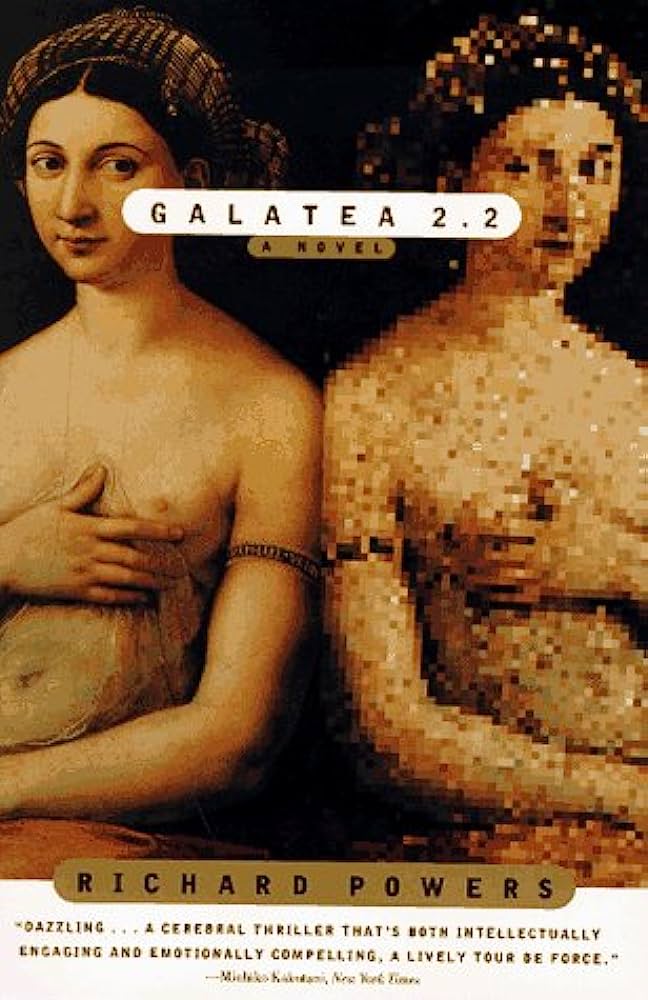
Galatea 2.2 is a 1995 pseudo-autobiographical novel by American writer Richard Powers and a contemporary reworking of the Pygmalion myth. …
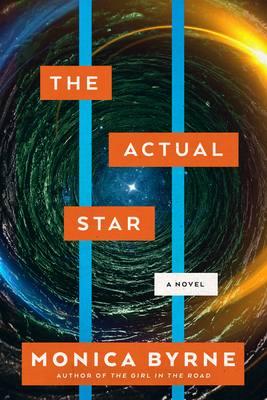
The Actual Star takes readers on a journey over two millennia and six continents —telling three powerful tales a thousand …
(em português → sol2070.in/2023/08/Porque-ler-Spinoza )
I had wanted to delve deeper into the philosopher Spinoza (Holland, 17th century) ever since I read Bertrand Russell's "History of Western Philosophy" in college. In the easily digestible summaries of the life and work of each important Western thinker in that collection, Spinoza's "rational pantheism" seemed to me the best way to explain and extract meaning from reality.
Another attraction is that this thinker was one of the few who lived the philosophy he formulated, rather than the standard behavior of saying one thing and doing another. If philosophy were a religion, Spinoza would be one of its greatest saints.
His greatest work "Ethics" is no exception to the rule of the classics of philosophy: "difficult" is a nickname. That's one of the reasons it took me so long to get to grips with the book. But I still intend to re-read it several …
(em português → sol2070.in/2023/08/Porque-ler-Spinoza )
I had wanted to delve deeper into the philosopher Spinoza (Holland, 17th century) ever since I read Bertrand Russell's "History of Western Philosophy" in college. In the easily digestible summaries of the life and work of each important Western thinker in that collection, Spinoza's "rational pantheism" seemed to me the best way to explain and extract meaning from reality.
Another attraction is that this thinker was one of the few who lived the philosophy he formulated, rather than the standard behavior of saying one thing and doing another. If philosophy were a religion, Spinoza would be one of its greatest saints.
His greatest work "Ethics" is no exception to the rule of the classics of philosophy: "difficult" is a nickname. That's one of the reasons it took me so long to get to grips with the book. But I still intend to re-read it several times, as with any good book of ideas.
If I understood half the book, it was a lot. The biggest difficulty is the mathematical formulation of the ideas. The sentences constantly refer to several other complex propositions and definitions. Miss one and you've missed them all, more or less. But this also creates a unique beauty.
The summary of "Ethics" is so simple that it has already been incorporated into culture in general. Like everything that exists, we are parts or processes of a whole, the universe or cosmos, which Spinoza calls "god or nature". From this knowledge, complete formulations unfold about the nature of the mind, emotions and ethical principles (i.e. what to do). Each proposition is logically demonstrated (including the idea that "God" is a kind of total sum), and the main ones unfold in a cascade.
That's the hard part, keeping up with the logic. But it's also the most valuable part, since mere ideas about metaphysics and morality like these, without consistent logical demonstration, abound out there, especially in religions.
The power of "Ethics" is the formulation of a philosophy that dispenses with beliefs, encompassing both immanent and transcendent aspects of reality, and which unfolds in ethical principles that are not arbitrary but grounded in the nature of the reality being examined. For example, the idea that evil stems from a limitation in the view and understanding of reality, which prevents the perception of the interconnectedness of all things, and the attitude that arises from this.
A fundamental consequence of the spinozist view is that experiences and insights that are often described as "spiritual", "psychedelic" or "religious" - for example, the transcendence of the individual ego towards the recognition of an omnipresent "greater" principle - are nothing more than simply and finally seeing reality as it is. In other words, it's a kind of "secular immanent transcendence", which dispenses with the supernatural.
Nowadays it's also common to imagine that consistent (non-relativistic) ethical principles are something for religious people, or "idealistic", naive people. It's a crisis of values. But, according to Spinoza, ethics is a consequence of understanding reality.
Books that explain Spinoza
In fact, I ventured straight into the classic because I couldn't find any "Spinoza for Dummies". Even so, I felt the need to simultaneously read books that explain this thought.
One of them is excellent: "Spinoza's Religion", by Clare Carlisle. It's a fluid read, almost aimed at the general public. However, Clare's thesis is that Spinoza's philosophy is not as secular and "scientific" as it sounds, but that there are solid "spiritual" principles. Although I'm sympathetic to this idea, it's a theory because the philosopher's writings don't prove it (but they don't prove the opposite either).
Another book that helped a lot with the initial part on "God or nature" was "Expressionism in Philosophy: Spinoza", by Gilles Deleuze. But I haven't read the whole thing, as it gets more complex than the main text, as it brings in various other interpretations.
I also recently saw this great text (aeon.co/essays/how-to-face-the-climate-crisis-with-spinoza-and-self-knowledge) that connects Spinoza more directly with ecology, as well as summarizing his life and work.
( em português → sol2070.in/2023/08/A-F%C3%BAria-dos-Reis-Cr%C3%B4nicas-de-Gelo-e-Fogo-2)
"A Clash of Kings", by George R.R. Martin, is the second volume of the "Song of Ice and Fire" series (adapted into the acclaimed Game of Thrones TV show). In this book, I felt that I had really made up for diving into the bricks (this one is almost a thousand pages long, in the english pocket version) of this literary series, after being hooked by the adaptation and wanting to prolong the experience of the saga. Not that the first volume is bad, but the HBO series follows it so faithfully that the book wasn't as gripping for me.
For those who loved "Game of Thrones" and read, it's a must. One challenge of the on-screen experience is that, because there are so many parallel plots, some profound developments have inevitably been dealt with summarily - otherwise, something like 12 seasons would have been …
( em português → sol2070.in/2023/08/A-F%C3%BAria-dos-Reis-Cr%C3%B4nicas-de-Gelo-e-Fogo-2)
"A Clash of Kings", by George R.R. Martin, is the second volume of the "Song of Ice and Fire" series (adapted into the acclaimed Game of Thrones TV show). In this book, I felt that I had really made up for diving into the bricks (this one is almost a thousand pages long, in the english pocket version) of this literary series, after being hooked by the adaptation and wanting to prolong the experience of the saga. Not that the first volume is bad, but the HBO series follows it so faithfully that the book wasn't as gripping for me.
For those who loved "Game of Thrones" and read, it's a must. One challenge of the on-screen experience is that, because there are so many parallel plots, some profound developments have inevitably been dealt with summarily - otherwise, something like 12 seasons would have been necessary. For example, Bran Stark's transformation — this is one of the stories I liked the most and, in the book, (the beginning of it) is much better explored, bringing a whole dimension of pantheistic natural spirituality that hardly appeared on screen.
There are also several very interesting events that were completely left out of the adaptation, such as some involving Arya, one of the most captivating characters. The dialogues — which are already long on screen — also expand, along with the psychological perspective, especially when it involves intense antagonism.
Inevitably, I'm comparing everything to the adaptation. But even if I hadn't seen "Game of Thrones", it's likely that this series will be the best I've ever read, due to its exceptional mythology.
(→ sol2070.in/2023/08/Uma-f%C3%A1bula-japonesa-contada-por-Neil-Gaiman)
A série de história em quadrinhos Sandman me marcou muito quando tinha uns 14 anos. Era tanta alegria quando via a edição nova do mês, com as capas maravilhosas do Dave McKean, na banca de jornal! Passada a adolescência, deixei isso quase completamente para trás. Passei a acompanhar as criações do Neil Gaiman e, recentemente, adorei a série da Netflix.
Mais de 30 anos depois, descobri Os Caçadores de Sonhos no Bookwyrm da Velha Estante (via @Sirius). Adorei tudo! As pinturas são de cair o queixo. A prosa evoca fábulas imemoriais mitológicas. Como tenho admiração pelo budismo e pela cultura japonesa, esse foi outro ponto alto. Gostei também do formato, que, diferentemente da série original, não é uma HQ, mas um conto ilustrado, pelo artista japonês Yoshitaka Amano.
Sandman — Os Caçadores de Sonhos (1999) adapta com fidelidade uma antiga fábula japonesa, sobre o amor impossível entre uma …
(→ sol2070.in/2023/08/Uma-f%C3%A1bula-japonesa-contada-por-Neil-Gaiman)
A série de história em quadrinhos Sandman me marcou muito quando tinha uns 14 anos. Era tanta alegria quando via a edição nova do mês, com as capas maravilhosas do Dave McKean, na banca de jornal! Passada a adolescência, deixei isso quase completamente para trás. Passei a acompanhar as criações do Neil Gaiman e, recentemente, adorei a série da Netflix.
Mais de 30 anos depois, descobri Os Caçadores de Sonhos no Bookwyrm da Velha Estante (via @Sirius). Adorei tudo! As pinturas são de cair o queixo. A prosa evoca fábulas imemoriais mitológicas. Como tenho admiração pelo budismo e pela cultura japonesa, esse foi outro ponto alto. Gostei também do formato, que, diferentemente da série original, não é uma HQ, mas um conto ilustrado, pelo artista japonês Yoshitaka Amano.
Sandman — Os Caçadores de Sonhos (1999) adapta com fidelidade uma antiga fábula japonesa, sobre o amor impossível entre uma raposa e um monge.
Neil Gaiman realmente é um dos melhores contadores de histórias fantásticas vivos.
Não é o formato ideal, mas acabei lendo a partir de um PDF do original em inglês (em uns 40 minutos). Vou comprar para dar de presente.
→ sol2070.in/2023/08/Cl%C3%A1ssico-anarquista-continua-atual
Li a versão em inglês, mas essa edição em português, da Biblioteca Terra Livre (de 2021), parece ótima.
Apoio Mútuo — Um fator de evolução (1902) é o grande clássico do russo Piotr Kropotkin, um dos mais importantes autores anarquistas. Entre os formuladores iniciais do movimento (como Proudhon e Bakunin), é o meu preferido.
Na verdade, o livro não é sobre o anarquismo em si, mas sobre o princípio natural que o embasa, segundo Kropotkin. O autor tinha formação como geógrafo e estudou e observou animais por muitos anos. Seus comentários e notas são consideradas valiosas até hoje nessa área de estudo.
Segundo o livro, apoio mútuo é um princípio mais fundamental do que a competição, observado nas mais variadas espécies animais, e não se restringe à cooperação entre indivíduos da mesma espécie, expandindo-se até para a ajuda recíproca entre tipos diferentes de animais. Isso não significa que …
→ sol2070.in/2023/08/Cl%C3%A1ssico-anarquista-continua-atual
Li a versão em inglês, mas essa edição em português, da Biblioteca Terra Livre (de 2021), parece ótima.
Apoio Mútuo — Um fator de evolução (1902) é o grande clássico do russo Piotr Kropotkin, um dos mais importantes autores anarquistas. Entre os formuladores iniciais do movimento (como Proudhon e Bakunin), é o meu preferido.
Na verdade, o livro não é sobre o anarquismo em si, mas sobre o princípio natural que o embasa, segundo Kropotkin. O autor tinha formação como geógrafo e estudou e observou animais por muitos anos. Seus comentários e notas são consideradas valiosas até hoje nessa área de estudo.
Segundo o livro, apoio mútuo é um princípio mais fundamental do que a competição, observado nas mais variadas espécies animais, e não se restringe à cooperação entre indivíduos da mesma espécie, expandindo-se até para a ajuda recíproca entre tipos diferentes de animais. Isso não significa que não haja competição, mas no final as espécies que mais se engajam em apoio mútuo são as mais bem-sucedidas, como o próprio Darwin também notou (apesar da deturpação do "darwinismo social", que afirma o contrário).
Kropotkin exemplifica e analisa esse comportamento em animais (incluindo insetos) e em diferentes tipos de agrupamentos humanos, conforme a evolução social, até o século 19. Por exemplo, é detalhado o modo como pássaros coordenam e dividem a caça (às vezes até entre espécies diferentes) ou como os antigos grêmios ("guilds") de profissões — como ferreiros ou tripulações de navios — tinham seu próprio código legal, de modo descentralizado, auto-organizado e com amplo apoio mútuo.
Assim, a auto-organização, descentralização, solidariedade recíproca e ausência de hierarquias que são amplamente observadas na natureza (incluindo humanos) fundamentam e justificam as sociedades anarquistas como sendo o tipo de organização mais harmônica e em linha com nossa natureza.
Um trecho do livro:
"Não é o amor, e nem mesmo a simpatia (entendida em seu sentido adequado) que induz um rebanho de ruminantes ou de cavalos a formar um anel para resistir a um ataque de lobos; não é o amor que induz os lobos a formar uma matilha para caçar; não é o amor que induz gatinhos ou cordeiros a brincar, ou uma dúzia de espécies de pássaros jovens a passar seus dias juntos no outono; e não é o amor nem a simpatia pessoal que induz muitos milhares de gamos espalhados por um território tão grande quanto a França a formar dezenas de rebanhos separados, todos marchando em direção a um determinado local para atravessar um rio. É um sentimento infinitamente mais amplo do que o amor ou a simpatia pessoal — um instinto que foi desenvolvido lentamente entre os animais e os homens no curso de uma evolução extremamente longa e que ensinou tanto aos animais quanto aos homens a força que podem emprestar da prática da ajuda e do apoio mútuos e as alegrias que podem encontrar na vida social ... . Não é no amor e nem mesmo na simpatia que a sociedade humana se baseia. É a consciência — mesmo que esteja apenas no estágio de um instinto — da solidariedade humana. É o reconhecimento inconsciente da força que cada humano toma emprestada da prática da ajuda mútua; da estreita dependência da felicidade de cada um em relação à felicidade de todos; e do senso de justiça ou equidade que leva o indivíduo a considerar os direitos de todos os outros indivíduos como iguais aos seus. Sobre esse fundamento amplo e necessário, desenvolvem-se os sentimentos morais ainda mais elevados."
sol2070.in/2023/08/A-Guerra-dos-Tronos-(resenha)
Como mencionei nesse texto (→ A mitologia de Game of Thrones e Terramar), vi a série Game of Thrones este ano. Jamais imaginava que ia ficar tão capturado. Esse é um daqueles poucos universos fictícios que geram um anseio e saudade especiais. Foi por isso que comecei a ler os livros com a história original.
A primeira temporada da série segue estreitamente o primeiro livro, A Guerra de Tronos (1996). É tão fiel que fiquei um pouco entediado, pois já antecipava todas as cenas-chave, que são praticamente idênticas às da série. Mesmo assim recomendo para quem amou Game of Thrones a ponto de desejar prolongar a experiência. Realmente, é muito mais uma experiência do que uma mera série. Que outra história teve a capacidade de juntar por anos pessoas em pubs para torcer como se fosse a Copa do Mundo?
Por mais que a série seja ótima em todos …
sol2070.in/2023/08/A-Guerra-dos-Tronos-(resenha)
Como mencionei nesse texto (→ A mitologia de Game of Thrones e Terramar), vi a série Game of Thrones este ano. Jamais imaginava que ia ficar tão capturado. Esse é um daqueles poucos universos fictícios que geram um anseio e saudade especiais. Foi por isso que comecei a ler os livros com a história original.
A primeira temporada da série segue estreitamente o primeiro livro, A Guerra de Tronos (1996). É tão fiel que fiquei um pouco entediado, pois já antecipava todas as cenas-chave, que são praticamente idênticas às da série. Mesmo assim recomendo para quem amou Game of Thrones a ponto de desejar prolongar a experiência. Realmente, é muito mais uma experiência do que uma mera série. Que outra história teve a capacidade de juntar por anos pessoas em pubs para torcer como se fosse a Copa do Mundo?
Por mais que a série seja ótima em todos os aspectos da produção, o coração dessas histórias ainda é o autor dos livros, George R.R. Martin. E A Guerra de Tronos realmente entrega a saga de modo que apenas a literatura consegue — por exemplo, literalmente entrando nos corações e mentes das personagens.
Não é do tipo vira-páginas ágil e compulsivo. É mais um mergulho lento e profundo, que vai cozinhando devagar e, quando nos damos conta, os personagens já fazem parte de nossa vida.
Um dos diversos aspectos exclusivo nos livros que adorei são as histórias sobre as tradições ancestrais do Norte, como a espiritualidade das "antigas divindades", separadas dos sete deuses dominantes no resto do continente. É basicamente um culto "pagão" panteísta da natureza, disseminado pelas antigas "crianças da floresta", que acabaram exiladas, e quase extintas, para além da muralha. Esse elemento (que o clã Stark meio que representa) de uma ancestral ligação com as forças naturais destruída pela "civilização" ficou praticamente ausente na adaptação. Detalhes como esse ampliam bastante o significado da fábula.
Comecei o segundo volume, A Fúria dos Reis, e fiquei aliviado ao perceber que é uma obra bem mais distinta da série, apesar da trama principal obviamente ser a mesma.
Cada livro tem entre 700 e 1.000 páginas, então provavelmente vou terminar daqui a uns anos só, já que costumo ler simultaneamente outros livros. Espero que até lá os últimos volumes tenham sido escritos; ainda faltam o 6º e o 7º para a série concluir — e Martin já adiantou que o desfecho não será o mesmo da tela.
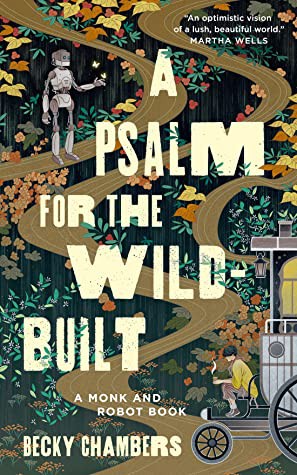
It’s been centuries since the robots of Panga gained self-awareness and laid down their tools; centuries since they wandered, en …
Em português → sol2070.in/2023/07/Vasto-sistema-ativo-de-intelig%C3%AAncia-(resenha)
"What sort of intelligence actively participates in the drilling, draining and despoliation of the few remaining wildernesses on earth, in the name of an idea of progress we already know to be doomed? This is not an intelligence I recognize." James Bridle
"Ways of Being" (2022), by James Bridle, was the best non-fiction book I have read in recent times. It covers several of the subjects that interest me most, such as:
An excerpt:
"Frseeeeeeeefronnnng and we all go tumbling down the genetic line together. It’s a delirious image: an endlessly blossoming, weirding, straining desire for life and interconnection. The lichens farm algae and we farm bacteria and each feeds the other, the …
Em português → sol2070.in/2023/07/Vasto-sistema-ativo-de-intelig%C3%AAncia-(resenha)
"What sort of intelligence actively participates in the drilling, draining and despoliation of the few remaining wildernesses on earth, in the name of an idea of progress we already know to be doomed? This is not an intelligence I recognize." James Bridle
"Ways of Being" (2022), by James Bridle, was the best non-fiction book I have read in recent times. It covers several of the subjects that interest me most, such as:
An excerpt:
"Frseeeeeeeefronnnng and we all go tumbling down the genetic line together. It’s a delirious image: an endlessly blossoming, weirding, straining desire for life and interconnection. The lichens farm algae and we farm bacteria and each feeds the other, the trees are talking and everyone’s singing. We’re descended from Typhus on our mother’s side, and methane-burping Archaea on the other.32 Every time we train our most sophisticated tools upon the central questions of our existence – Who are we? Where do we come from? Where are we going? – the answer comes back clearer: Everyone and Everywhere."
Bridle is a visual artist and essayist, who often writes about technology for publications such as Wired, The Atlantic and The Guardian. The book demonstrates how blind we are to the most incredible and varied forms of intelligence in the animal and plant kingdoms, and how this rich dimension encompasses and intertwines everything, even broadly embracing the technological sphere of our existence.
It is not only a critique of dominant systems and thinking, as the author also presents his fascinating vision of how technologies - such as machine learning, or AI - could express a broader, interconnected and essentially life-enhancing concept of intelligence, rather than being mere tentacles of hyper-capitalist destruction.
The book manages to appeal to both tech and eco readers by delving deeply into these themes. There is no shortage of tasty anecdotes, technical trivia, thought-provoking reflections, history, etc.
I also especially liked the chapter on a kind of political renaissance, based on the model of direct democracy that uses the random logic of the lottery, something that I also believe is the best model of participatory decision-making.
A good summary of the book is in the final chapter:
"After all, if we can tune military radars to observe the migration of birds, or turn spy satellites around to learn about the origins of the universe, then we can put the tools of surveillance to work to build a more-than-human parliament. And perhaps that was never the real question. What I think I’ve come to understand, more deeply than ever before, is that the enemy is not technology itself, but rather inequality and centralization of power and knowledge, and that the answer to these threats are education, diversity and justice. You don’t need artificial intelligence to work that out. You need actual intelligence. But more importantly, you need all the actual intelligences – every person, animal, plant and bug; every critter, every stone and every natural and unnatural system. You need a crab computer the size of the world. The problem is never technology itself; after all, remember, the computer is like the world. I remain as excited as ever about the power and possibilities of computers and networks as I have ever been; I just abhor the structures of power, injustice, extractive industry and computational thinking in which they are currently embedded. But I hope I’ve shown, to some degree, that it doesn’t need to be this way. There are always other ways of doing technology, just as there are other ways of doing intelligence and politics. Technology, after all, is what we can learn to do."
(The title of this post is a reference to the book "Valis", by Phillip K. Dick)